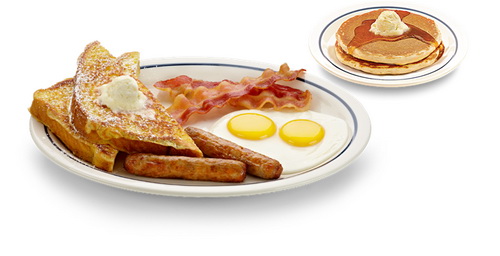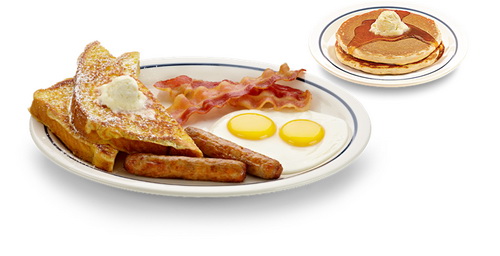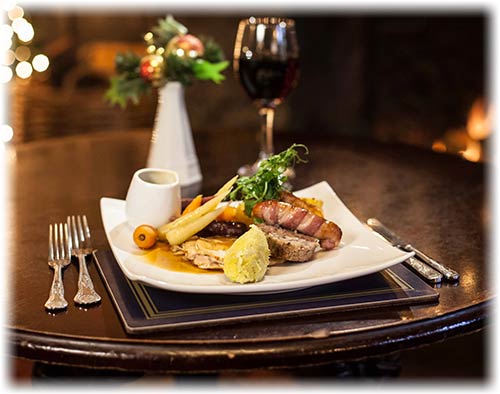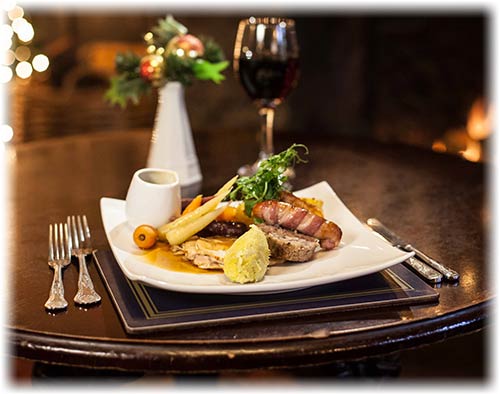dinner
din·ner [dinner dinners] [ˈdɪnə(r)] [ˈdɪnər] noun
1. uncountable, countable the main meal of the day, eaten either in the middle of the day or in the evening
• It's time for dinner.
• When do you have dinner?
• What time do you serve dinner?
• Let's invite them to dinner tomorrow.
• What shall we have for dinner tonight?
• It's your turn to cook dinner.
• She didn't eat much dinner.
• I never eat a big dinner.
• Christmas dinner
• a three-course dinner
• I'd like to take you out to dinner tonight.
• (BrE) school dinners (= meals provided at school in the middle of the day)
2. countable a large formal social gathering at which dinner is eaten
• The club's annual dinner will be held on 3 June.
see also dinner party
more at a dog's breakfast/dinner at dog n.
Idiom: done like a dinner
Word Origin:
Middle English: from Old French disner (infinitive used as a noun), probably from desjëuner ‘to break fast’, from des- (expressing reversal) + jëun ‘fasting’.
Culture:
meals
Americans and British people generally eat three meals a day though the names vary according to people’s lifestyles and where they live.
The first meal of the day is breakfast. The traditional full English breakfast served in many British hotels may include fruit juice, cereal, bacon and eggs, often with sausages and tomatoes, toast and marmalade, and tea or coffee. Few people have time to prepare a cooked breakfast at home and most have only cereal and/or toast with tea or coffee. Others buy coffee and a pastry on their way to work.
The traditional American breakfast includes eggs, some kind of meat and toast. Eggs may be fried, ‘over easy’, ‘over hard’ or ‘sunny side up’, or boiled, poached or in an omelette (= beaten together and fried). The meat may be bacon or sausage. People who do not have time for a large meal have toast or cereal and coffee. It is common for Americans to eat breakfast in a restaurant. On Saturday and Sunday many people eat brunch late in the morning. This consists of both breakfast and lunch dishes, including pancakes and waffles (= types of cooked batter) that are eaten with butter and maple syrup.
Lunch, which is eaten any time after midday, is the main meal of the day for some British people, though people out at work may have only sandwiches. Some people also refer to the midday meal as dinner. Most workers are allowed about an hour off work for it, called the lunch hour, and many also go shopping. Many schools offer a cooked lunch (school lunch or school dinner), though some students take a packed lunch of sandwiches, fruit, etc. Sunday lunch is special and is, for many families, the biggest meal of the week, consisting traditionally of roast meat and vegetables and a sweet course. In the US lunch is usually a quick meal, eaten around midday. Many workers have a half-hour break for lunch, and buy a sandwich from near their place of work. Business people may sometimes eat a larger lunch and use the time to discuss business.
The main meal of the day for most people is the evening meal, called supper, tea or dinner. It is usually a cooked meal with meat or fish or a salad, followed by a sweet course. In Britain younger children may have tea when they get home from school. Tea, meaning a main meal for adults, is the word used in some parts of Britain especially when the evening meal is eaten early. Dinner sounds more formal than supper, and guests generally receive invitations to ‘dinner’ rather than to ‘supper’. In the US the evening meal is called dinner and is usually eaten around 6 or 6.30 p.m. In many families, both in Britain and in the US, family members eat at different times and rarely sit down at the table together.
Many people also eat snacks between meals. Most have tea or coffee at mid-morning, often called coffee time or the coffee break. In Britain in the past this was sometimes also called elevenses. In the afternoon many British people have a tea break. Some hotels serve afternoon tea which consists of tea or coffee and a choice of sandwiches and cakes. When on holiday/vacation people sometimes have a cream tea of scones, jam and cream. In addition many people eat chocolate bars, biscuits (AmE cookies) or crisps (AmE chips). Some British people have a snack, sometimes called supper, consisting of a milk drink and a biscuit before they go to bed. In the US children often have milk and cookies after school.
Thesaurus:
dinner noun U, C
• They invited us to dinner.
lunch • • supper • • meal • • banquet • • feast • |BrE tea • |formal luncheon •
have/invite sb for/to dinner/lunch/supper/a meal/banquet/feast/tea/luncheon
eat/serve dinner/lunch/supper/a meal/tea/luncheon
get dinner/lunch/supper/tea/a meal
Which word? A main or formal meal eaten in the evening is usually called dinner. Lunch is eaten in the middle of the day; in Britain some people call this dinner if it is the main meal of the day. Tea is usually a light afternoon meal with a cup of tea, but it can also refer to an evening meal, especially one for children. Supper is an informal evening meal or a light meal before bedtime.
Collocations:
Restaurants
Eating out
eat (lunch/dinner)/dine/meet at/in a restaurant
go (out)/take sb (out) for lunch/dinner/a meal
have a meal with sb
make/have a reservation (in/under the name of Yamada)
reserve/ (especially BrE) book a table for six
ask for/request a table for two/a table by the window
In the restaurant
wait to be seated
show sb to their table
sit in the corner/by the window/at the bar/at the counter
hand sb/give sb the menu/wine list
open/read/study/peruse the menu
the restaurant has a three-course set menu/a children's menu/an extensive wine list
taste/sample/try the wine
the waiter takes your order
order/choose/have the soup of the day/one of the specials/the house (BrE) speciality/(especially NAmE) specialty
serve/finish the first course/the starter/the main course/dessert/coffee
complain about the food/the service/your meal
enjoy your meal
Paying
pay/ask for (especially BrE) the bill/(NAmE) the check
pay for/treat sb to dinner/lunch/the meal
service is (not) included
give sb/leave (sb) a tip
More About:
meals
People use the words dinner, lunch, supper and tea in different ways depending on which English-speaking country they come from. In Britain it may also depend on which part of the country or which social class a person comes from.
A meal eaten in the middle of the day is usually called lunch. If it is the main meal of the day it may also be called dinner in BrE, especially in the north of the country.
A main meal eaten in the evening is usually called dinner, especially if it is a formal meal. Supper is also an evening meal, but more informal than dinner and usually eaten at home. It can also be a late meal or something to eat and drink before going to bed.
In BrE, tea is a light meal in the afternoon with sandwiches, cakes, etc. and a cup of tea: ▪ a cream tea. It can also be a main meal eaten early in the evening, especially by children: ▪ What time do the kids have their tea?
As a general rule, if dinner is the word someone uses for the meal in the middle of the day, they probably call the meal in the evening tea or supper. If they call the meal in the middle of the day lunch, they probably call the meal in the evening dinner.
Brunch, a combination of breakfast and lunch, is becoming more common, especially as a meal where your guests serve themselves.
Example Bank:
• A gala dinner was held to celebrate the world premiere of the movie.
• A state dinner was held in honour of the visiting Japanese premier.
• Are we expected to dress for dinner?
• I always forgot to take my dinner money to school.
• My old school is giving a fund-raising dinner
• The club's annual dinner is this week.
• The extensive dinner menu includes Russian delicacies.
• The former Olympic champion was invited to speak at a charity dinner.
• The school dinner menu always includes a balance of food types.
• There was never much conversation at the dinner table in my family.
• They invited three couples to a dinner party at their house.
• We attended the formal reunion dinner.
• We didn't wash up the dinner things until the morning after.
• We're going to attend a formal dinner in aid of cancer research.
• a bone-china dinner service
• the society's annual dinner dance
• Have you had dinner yet?
• I used to hate school dinners.
• I'd like to take you out to dinner tonight.
• It's time for dinner.
• It's your turn to get dinner.
• Let's invite them to dinner.
• She didn't eat much dinner.
• The club's annual dinner will be held on the 4th of June.
• The evening includes a three-course dinner with wine.
dinner table
ˈdinner table f91 [dinner table dinner tables] noun (often the dinner table) usually singular
the table at which people are eating dinner; an occasion when people are eating together
• conversation at the dinner table
• The dinner table was laden with crystal and silver.
compare dining table




